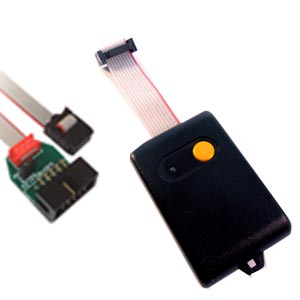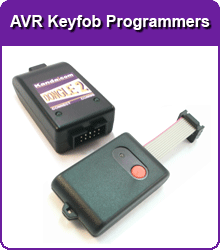Selected Category and Product:
Programmers-Burners » Keyfob Mini Programmers » Keyfob AVR Programmers » KF0020V3
Secure Payment by

256KB AVR Keyfob

- Standalone AVR programmer in keyfob case
- One button press to program target
- Programmer only, see KF0010V3 for version with PC loader
- Rubust, easy to use, supports most AVR microcontrollers
- Easy to reprogram, retains code and settings for ever
- No battery required
- Supports ISP and UPDI programming interfaces
Shipping to United States
Recorded Airmail: $15.00
Fedex Express: $39.00
Recorded Airmail: $15.00
Fedex Express: $39.00
Order Code
KF0020V3
KF0020V3
Price: $99.00
In Stock
Related Products
USB 256KB Keyfob Mini-programmer for AVR ISP and UPDI
AVR ISP and AVR UPDI ProgrammerA completely portable programmer for In System Programming of AVR flash microcontrollers, for field and production use with 256KB of memory. This programmer comes in a key fob case and has one button operation to eliminate operator errors. Removes the need for a PC on the production line or in the field.
Just load using the 256KB AVR Keyfob Mini-programmer USB Starter Kit
Once the programmer is loaded, just keep plugging it into your target boards and program/verify Flash, EEPROM, User Area, Fuses and lock bits with a single button press.
This product is just the keyfob programmer without PC loader
You need one Keyfob Programmer Starter Kit to load as many programmers as you like from the PC. Once the programmer is loaded it is completely portable.
You need one Keyfob Programmer Starter Kit to load as many programmers as you like from the PC. Once the programmer is loaded it is completely portable.
Features
- Minature portable AVR programmer, target or PC powered
- 256KB program memory (for Flash, EEPROM, User Area)
- Single button operation
- Dimensions: Metric- 45mm x 35mm x 15mm - 28g
- Dimensions: Imperial - 1.8 x 1.4 x 0.5 inches - 1 oz
- Easy to load, easy to use
- Reprogram as many times as you need
- Holds program code indefinitely
- Loaded from PC using USB dongle
- No battery required
- Powered by PC Dongle or AVR target
- 10-way ISP connector
- 6 way ISP/UPDI adapter included
- AVR ISP and AVR UPDI Programmer
- Voltage Support: down to 3.3V. For support down to 1.8V, look at AVR Hand held Programmer
Compare new V3 Version with older 64KB Keyfob V1 version
- 256 KB instead of 64 KB memory
- Supports UPDI interface as well as ISP
- Requires software v8.3.0 up - this also supports V1 keyfob
- Uses same Kanda USB dongle as old keyfobs and handheld
- No battery fitted or needed with V3
- Yellow button rather than red for easy identification
- V3 keyfob can't be loaded using PRG files created from older V1 units
- V3 includes 10DIL6 adapter
AVR Microcontroller Support
- Older AVR: AT90S1200, AT90S2313, AT90S2323, AT990S2333, AT90S2343
- AT90S4414, AT90S4433, AT90S8515,AT90S8535, ATmega103
- AT90CAN128, AT90CAN32, AT90CAN64
- AT90PWM2/3
- AT90USB1286, AT90USB646
- ATmega128, ATmega1280, ATmega1281, ATmega128RFA1
- ATmega16, ATmega161, ATmega162, ATmega163, ATmega165, ATmega168, ATmega169
- ATmega16M1, ATmega16U2, ATmega16U4
- ATmega32, ATmega323, ATmega324, ATmega325, ATmega3250, ATmega328, ATmega329
- ATmega3290, ATmega32C1, ATmega32M1, ATmega32U2, ATmega32U4, ATmega32U6
- ATmega48, ATmega64, ATmega640, ATmega644, ATmega645, ATmega6450, ATmega649
- ATmega6490, ATmega64C1, ATmega64M1
- ATmega8, ATmega8515, ATmega8535, ATmega88, ATmega8U2
- ATtiny13, ATtiny15, ATtiny1634, ATtiny167
- ATtiny2313, ATtiny24, ATtiny25, ATtiny26, ATtiny261
- ATtiny4313, ATtiny43U, ATtiny44, ATtiny45, ATtiny461, ATtiny48
- ATtiny84, ATtiny85, ATtiny861, ATtiny87, ATtiny88
- ATtiny441, ATtiny841
- ATmega2560, ATmega2561
- All P (PicoPower),PA, V, L and A AVR microcontrollers are supported, only down to 3.3V.
AVR Microcontroller Support - UPDI
AVR ATtiny UPDI Support
- ATtiny202, ATtiny402, ATtiny204, ATtiny404, ATtiny804, ATtiny1604
- ATtiny406, ATtiny806, ATtiny1606, ATtiny807, ATtiny1607
- ATtiny212, ATtiny412, ATtiny214, ATtiny414, ATtiny814, ATtiny1614
- ATtiny416, ATtiny816, ATtiny1616, ATtiny3216
- ATtiny417, ATtiny817, ATtiny1617, ATtiny3217
- ATtiny424, ATtiny426, ATtiny427
- ATtiny824, ATtiny826, ATtiny827
- ATtiny1624, ATtiny1626, ATtiny1627
- ATtiny3224, ATtiny3226, ATtiny3227
ATmega UPDI Support
- ATmega808, ATmega1608, ATmega3208, ATmega4808
- ATmega809, ATmega1609, ATmega3209, ATmega4809
AVR D Series UPDI Support
- AVR128DA28, AVR128DA32, AVR128DA48, AVR128DA64
- AVR32DA28, AVR32DA32, AVR32DA48
- AVR64DA28, AVR64DA32, AVR64DA48, AVR64DA64
- AVR128DB28, AVR128DB32, AVR128DB48, AVR128DB64
- AVR64DB28, AVR64DB32, AVR64DB48, AVR64DB64
- AVR32DB28, AVR32DB32, AVR32DB48
- AVR16DD14, AVR16DD20, AVR16DD28, AVR16DD32
- AVR32DD14, AVR32DD20, AVR32DD28, AVR32DD32
- AVR64DD14, AVR64DD20, AVR64DD28, AVR64DD32
- AVR64EA28, AVR64EA32, AVR64EA48
- AVR16EB14, AVR16EB20,AVR16EB28, AVR16EB32
New devices will be supported as they are released
For support down to 1.8V, JTAG, PDI (ATxmega) and TPI interfaces plus extra features like serial numbering and usage limit, see Handheld Programmer
Important Note
You will need any Kanda USB Dongle to load this programmer. One USB Starter Kit will allow you to load as many USB Keyfob Mini-programmers as you want.
Starter Kit
Purchase Options
You can also buy the USB Starter Kit with 6 Keyfob Mini-programmers.
USB Keyfob Field Service Pack
Extra Keyfob Mini-programmers are available in packs of 5, which gives you a big saving in cost.
USB Keyfob Mini-programmer Multi-pack
Handheld Programmer
The keyfob is NOT designed to cope with faulty target boards, so you should test or isolate target boards first, or use the handheld programmer instead.
A more robust Handheld programmer is available, which is ideal for use on the production line. It operates in the same way as the keyfob but has extra features for production use and 256Kb memory. This programmer is ideal for adding Boot Block code to ATmega128 devices.
Handheld Programmer
6-Way adapters
We now have adapters to convert from the standard Kanda 10-way header to different 6-way headers.
6-Way DIL adapter Included with programmer.
6 x 1-way leads
6-Way Micromatch connector
Overview of AVR Programmer Range
See Guide to AVR ISP Circuits for schematics of recommended AVR ISP circuits (new window).
See Overview of Kanda AVR Programmer Range
No Battery Requirement
The AVR target must be powered, which also powers keyfob. For programming un-powered target, you need Handheld Programmer.When loading from PC, Dongle2 (introduced 2013) or Dongle3 will power the keyfob. If you have original Dongle (see label), you will need a battery or to purchase Dongle3 - see Product Accessories below.
Documentation
This opens in a new window.
Ordering Information
| Ordering Information | Order Code: KF0020V3 | Price: $99.00 |
| Shipping to United States: | Recorded airmail - $15.00 | Fedex Express - $39.00 |














